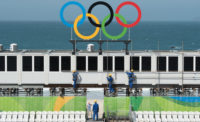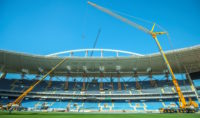Five Minutes with Jerry Brodsky on the Rio Olympics

Brodsky hopes dispute review boards will provide a useful legacy to Brazil.
To prevent trouble on the roughly 35 non-permanent structure contracts to be awarded for next summer’s Olympics games, the Rio 2016 Organizing Committee has set up a dispute program and appointed Jerry Brodsky, director of the Latin American practice group for Peckar & Abramson, to lead it. ENR Deputy Editor Richard Korman spoke to Brodsky about his role, how the boards are being formed and possible long-term benefits for Brazil. The following is an edited version of that conversation.
ENR What kinds of contracts are we speaking about and who is likely to get them?
Brodsky Temporary power, air-conditioning, water, media facilities, all scaffolding, and temporary seating. Most of the companies that will perform them are Brazilian because that’s who is here and best able to perform work of this scale. The contracts themselves will be pretty standard.
Why is this special?
Arbitration is relatively new in Brazil and they don’t have a rich historical track record in that method of resolving disputes, but being an arbitrator and dispute board member is completely different. An arbitrator decides what is in front of them at an arbitration proceeding. A disputes board accompanies the execution of the contract all the way to the end.
Who is serving on the boards created so far?
Experienced architects, engineers, technical professions and lawyers.
We trained all of them, but training only gets you so far. We imported some from around Latin America, from some areas where there is a rich history of dispute resolution, people who know how to manage this tribunal of three. We did that by finding top people in Latin America, and while most don’t speak Portuguese but their Spanish and that will be close enough and what they bring in experience will be so valuable.
How will it work?
For each contract, the standard form of contract requires at signing the formation of a dispute board, mostly with three members. Part of the rules include the selection process under which each party selects two members and the two board members then select a third—in this way it is similar to arbitration. The list of candidates come from lists that are being posted by the Dispute Resolution Board Foundation, people who are certified and trained.
Will the dispute board members be paid?
Among the documents approved are a table of compensation; the board members get paid for availability and time at market rates. Most activities have to be face- to-face because that’s how they are resolved: by sitting at a table in a trailer with no suits, no ties and no gavels.
In addition to settling or preventing disputes, what is the best possible outcome of the dispute avoidance program?
Maybe leaving a legacy for Brazil. That’s also an important part of our assignment, to set it up so Brazil can continue the use of dispute boards. Brazilians who get first shot in this setting will become in future the chairs and they will no longer need to import people to serve in that role.




Post a comment to this article
Report Abusive Comment